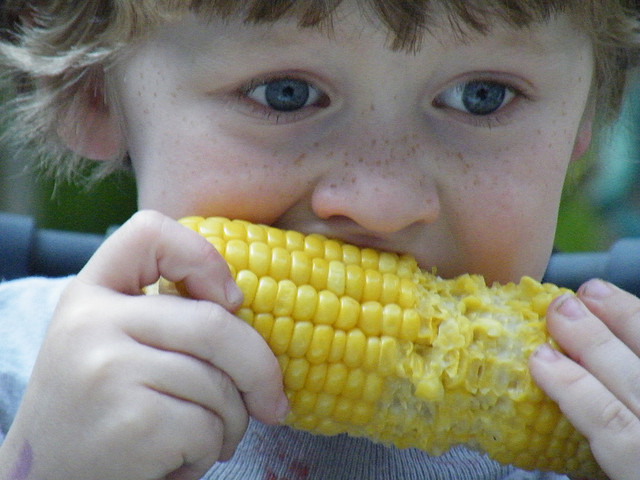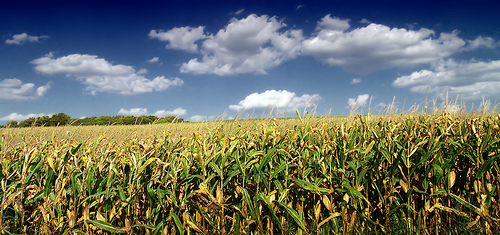Summer and corn on the cob are almost synonymous in my book. When corn is in season it’s unbelievably sweet and delicious and I can’t get enough. Every trip to the local farm stand or grocery store inevitably involves bringing home a dozen ears.
While my love of corn isn’t wavering, my willingness to eat it a few times a week is changing.
Most corn in the US is genetically engineered
During a recent family vacation in Wisconsin I couldn’t help but notice field upon field of corn stalks. While staring in amazement at the never-ending ears I began to realize that most of it (if not all of it) was genetically engineered.
Corn is the No. 1 crop grown in the U.S. and nearly all of it — 88 percent — is genetically modified. What’s even more alarming is that although common in the U.S., GMO corn is banned in the 28-nation European Union. What do they know that we don’t? I think a lot.
My love of corn on the cob began when I was very young. Every summer I looked forward to going to the Sweet Corn Festival in Wisconsin. Once the nominal admission fee was paid it was all you can eat. Let’s just say I don’t do well with buffets. I have vivid memories of feasting on sweet corn until I was physically sick.
Fast forward to the present. The sweet corn festival continues in my very own dining room usually 2-3 times a week. Especially this time of year we can’t eat enough-it’s delicious.
There’s no GMO label on my corn
GMO corn has been manipulated in labs to resist disease and drought, ward off insects and “boost the food supply” and the long term damage to us is still being studied.
Europe requires all GM food to be labeled unless GM ingredients amount to 0.9 percent or less of the total, but not here in the US. We know that most corn sold in the US is genetically modified, but it isn’t labeled in the US because it doesn’t have to be. We all have the right to know what we’re eating, don’t we?
Choosing organic corn is one way to avoid GMOs, but organic corn on the cob can be hard to come by.
The health risks of GMOs
The long-term health effects of GMOs are being studied and we have a long way to go. I worry. GMO corn requires massive amounts of pesticides, herbicides and fungicides. It can’t be good. How many times have you heard someone say: “I don’t remember kids having food allergies when I was growing up”? Maybe GMO’s are the cause or at least a factor in this surge of food allergies, environmental allergies, ADHD and other diagnoses.
Everything in moderation
I’ve always been a believer in “everything in moderation”, but there are also foods that just shouldn’t be eaten. Ever. I’m not suggesting that corn on the cob is one of those foods, but I do think it’s time I gave some thought to how often we eat it.
So there you have it. I’ll be scouring the farmer’s market and local farm stands for organic corn and cutting back on the amount of conventional corn on the menu.
Do you avoid genetically modified corn or eat it in moderation?
photo credit: Nicholas_T via photopin, kmakice via photopin cc


